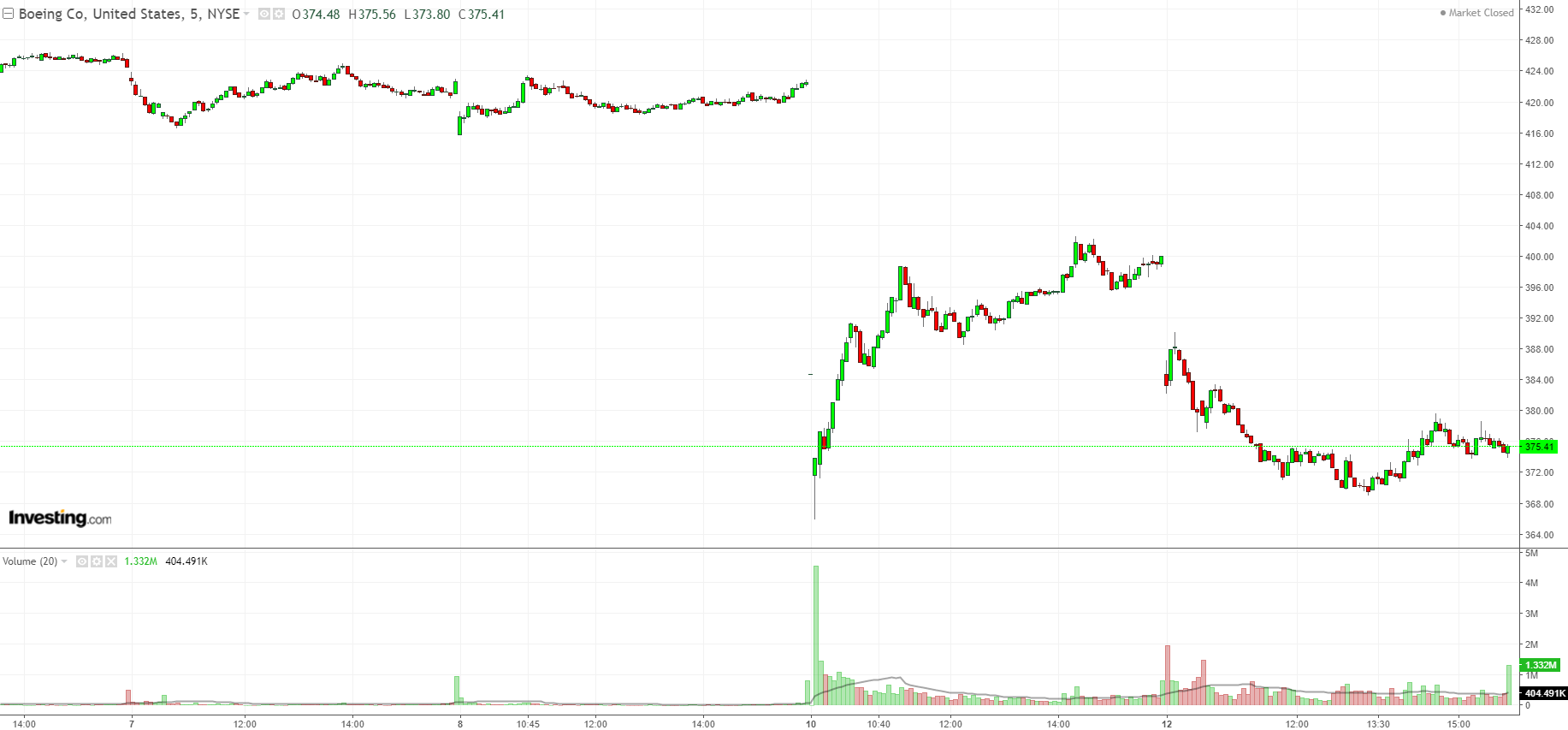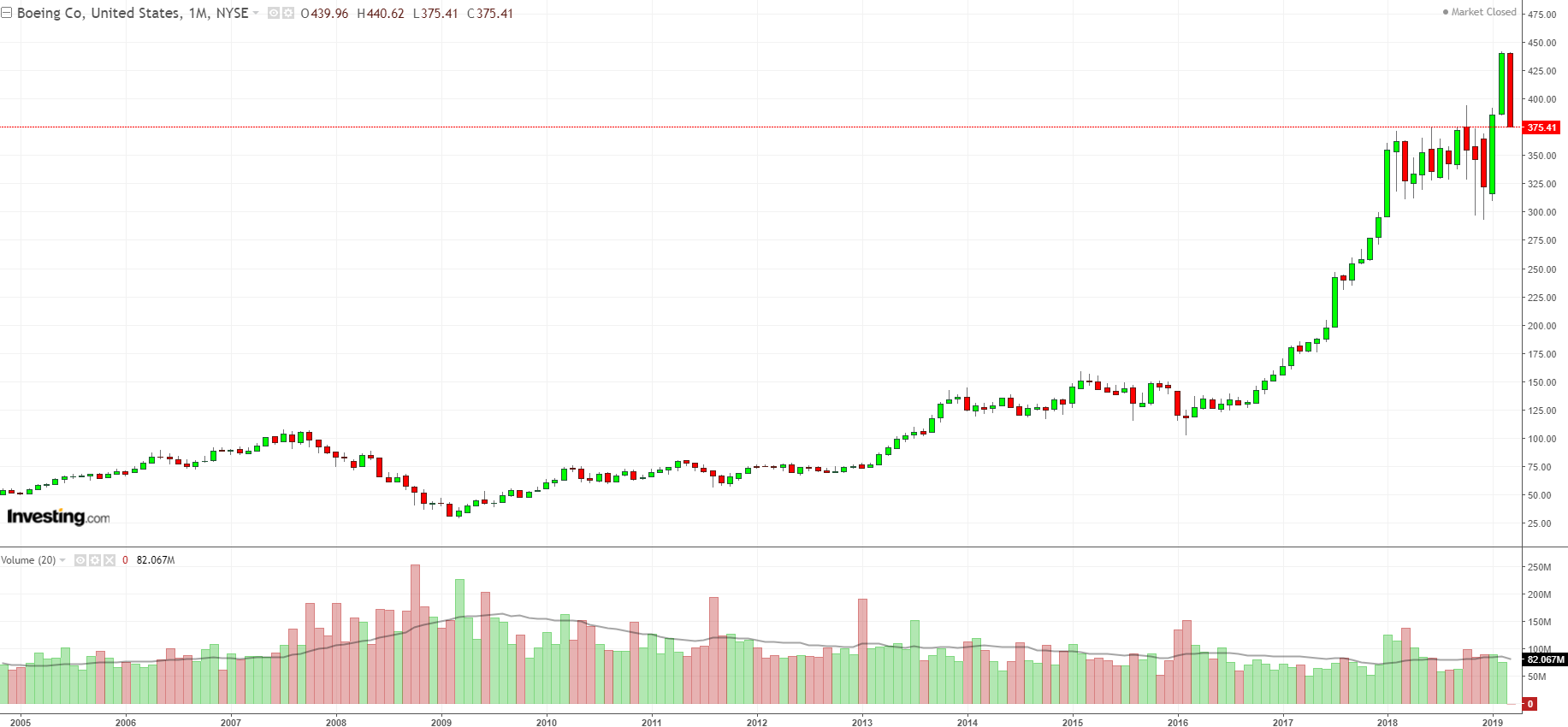Sunday's tragic Ethiopian Airlines crash, which killed all 157 passengers on board, was the second deadly crash of a Boeing (NYSE:BA) jet in the past five months. It was yet another calamity for Boeing's 737 MAX 8, the newest iteration of its best-selling commercial jetliner, first introduced in early 1968. Over the 51 years this model has been available, over 10,000 units have been sold.
Following Sunday's crash, which early reports are attributing to the plane's flight control system, a variety of airlines as well as European, Asian and Latin American government regulators have grounded the airplanes or barred flights of the 737 MAX 8 over their airspace. For now, the American Federal Aviation Administration (FAA) has declared the 737 MAX 8 ‘airworthy,’ though some Congressional lawmakers are calling for voluntary grounding in the U.S.

Since Monday's U.S. open, Boeing's stock has been whipsawed by volatility. Shares started Monday at $371, 12% lower than Friday’s close at $422. By the end of the day, however, the stock had recovered 7.8% to close at $400. Yesterday, another day of major volatility for the stock, Boeing lost another 6%, closing at $375.41. Is the current slide just the beginning of a potentially deeper plunge?
Panic Selling, Predictable Recovery
Last October, when Indonesia's Lion Air crashed, killing all 189 passengers—at that time the most serious incident ever for Boeing's 737 MAX 8—markets reacted similarly. The stock plummeted on the news, but recovered within days. Panic selling pressured the stock: it dropped 8.8% on the news, but within 48 hours prices were back to pre-crash levels.
An analogous situation occurred in 2013 as well after Boeing's 787 Dreamliners were grounded by U.S. and European aviation authorities because of problems with the planes' lithium ion batteries. At that time Boeing's stock dropped 6.5% as the news spread, but rallied in succeeding days, gaining 97% by the end of the year.
Clearly, the airline manufacturer has been through something like this before. And its stock continues to thrive.

There are a number of reasons the scenarios are comparable. It's common—and even predictable—for investors and algorithms to react quickly, and generally prematurely, without having all the necessary data to make an educated decision. The logic is simple: a Boeing airplane crashed, so the company must be in danger.
All too often, this premise simply isn’t true. Many things can cause an airplane crash, and in most cases these events end up being attributable to faulty operation rather than faulty equipment.
As well, detailed crash investigation reports often don’t come out until months, if not years, after the events occur. Merely gathering data from the site of a crash isn’t easy, and often there are many variables at play making definitive results hard to pin down and in several cases almost impossible, meaning reports can be inconclusive.
Five years ago, Malaysia Airlines flight 370 crashed. To this day, there is still no agreed-upon reason for the crash, and disparate theories include a power interruption and a potential hijacking.
Could This Time Be Different?
Yes and no. Two of the same model aircraft crashing within five months of each other, something that's never happened before, shouldn't be taken lightly. And regulatory agencies across the world temporarily banning the aircraft is a major point of concern as well.
However, Boeing still holds a duopoly within the industry, in conjunction with Airbus Group (PA:AIR). This is a strong point in its favor since there are impossibly high barriers to entry for new competitors.
Additionally, both Airbus and Boeing receive significant subsidies from their respective governments, in the form of tax breaks, from the U.S in the case of Boeing, from France and Germany for Airbus. In no small part, that's because having control of the direction of aviation innovation provides a strategic advantage, both militarily and from a civilian perspective. By being able to dictate the future direction of the industry, each country's air superiority is insured, a crucial advantage for any future conflicts.
As long as the U.S government continues to back Boeing, the company will rebound in the long-term. In addition, just a month ago, Airbus announced it was scraping its jumbo A380, leaving Boeing with a monopoly over large passenger carriers.
Adding to that, Boeing has over 5000 outstanding orders for the 737 model. Plus, In 2015, a report by the company concluded: “Over the next 20 years, Boeing is forecasting a need for over 39,600 airplanes, valued at more than $5.9 trillion.” According to Boeing, demand is expected to get even stronger in upcoming decades.
Finally, a report from the Wall Street Journal, published yesterday, says "Boeing is making an extensive change to the flight-control system in the 737 MAX aircraft...going beyond what many industry officials familiar with the discussions anticipated." The article says aviation regulators in the U.S. are "expected to mandate the change by the end of April."
Using 2013 once again as an example, at that time it took Boeing three months to issue a fix, after which everything, including market activity, continued running smoothly. Clearly, Boeing has the capacity to address and alleviate safety issues.
Bottom Line
Given all these factors, we're in favor of holding on to the stock. Boeing's continued health is a strategic advantage for the U.S., regardless of the current political environment.
In addition, Boeing has been navigating treacherous airline safety issues for 102 years. It's overcome such major blows as the JAL flight 123 crash in 1985 that killed 520 people, and Malaysia Airline's flight 17, which crashed in 2014 and was eventually acknowledged to have been shot down, killing 283 passengers and 15 crew.
And of course, the trend in airline safety is obvious, as the average deaths per year dropped last year to 399, compared to an average of well over 2000 deaths per year in the seventies. Boeing will undoubtedly see significant revenue growth from its innovation within aviation industry going forward.
